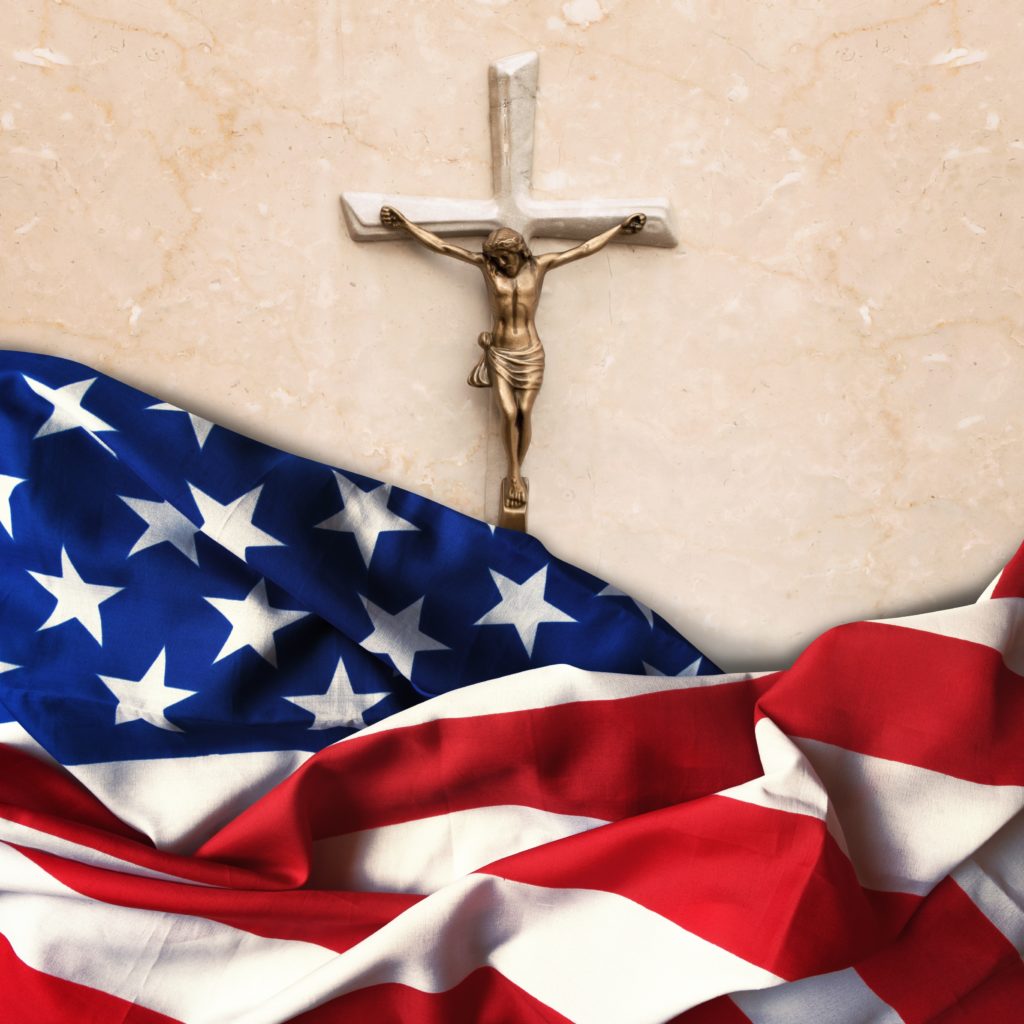In 2013, a free print of the Blessed Mother was distributed with The Tablet, the weekly newspaper of the Diocese of Brooklyn. The image portrayed her wrapped in the American flag with the lyrics of “God Bless America” set as the background. Some readers welcomed the print. Others were fearful that it co-opted faith to a patriotic and political agenda.
As Catholics, we are simultaneously “in Christ” and in the world, citizens of both heaven and the nation we belong to. How to manage those twin loyalties is an ancient question that has been consistently asked throughout history.
When Catholic Christianity finally became the official religion of the Roman Empire in A.D. 380, the Church had to navigate new relationships with political authority, seeking to “give to the emperor the things that are the emperor’s and to God the things that are God’s” (Mark 12:17). Doctors and Fathers of the Church, canon lawyers, theologians, and Church councils have sought to define these two calls on our allegiance and identity. Since the Russian invasion of Ukraine, in which the Moscow Patriarch Kirill has given his Church’s blessing to tragic savagery, that question has come to the forefront.
Catholic theology has done much deep thinking on the role of the state, but the Church has given much less attention to nationality and national identity. It needs to do more to teach us how to hold together love of country, love of our fellow human beings, and love of God.
The natural affection we feel for the places where we are born and where we live, the generations of people who have come before us and the traditions of our homelands, is important. Those bonds are often full of deep emotion and can be directed toward the good. But if that loyalty moves toward a bad direction, it can turn into ugly xenophobia or aggressive nationalism. The Gospel purifies those impulses.
As Catholic Christians, we belong to a living community that embraces the whole globe. Pope Benedict XVI, while visiting Auschwitz in 2006, affirmed: “We must always learn that we are Catholic, and thus that one’s nationality is inserted, relativized, and also carefully located in the great unity of the Catholic communion.”
The practical question is how to do that. And I think the answer is the Incarnation.
According to the Council of Chalcedon, in the incarnation, Jesus’ humanity and his divinity were united, but in a way that maintained the distinction between the two. Taking our clues from the Incarnation helps us maintain our natural affection for our homeland with the demands of our Catholic faith, in a spiritually healthy way. That task means holding together cultural diversity and global fraternity in a tension that is harmonious and creative.
That combination however is easier to get wrong than right.
When Christians over-identify their faith with their particular country or culture, they easily end up with something less than the sum of its parts: a national identity that uses religious imagery and language, but which is only superficially Christian. This is a very common temptation for people of faith who also love their homeland. There are many examples, among them claiming “chosen nation” status and inventing apparently religious reasons to declare war on fellow Christians, when the real motivation is political.
When such things happen, Christians are no longer “leaven in the dough” or “salt of the earth.” The gospel loses its prophetic edge.
In the incarnation, Jesus remained fully human. As Catholics, we are not required to put aside our natural inclinations, such as love of family or country, but we are asked to put them into relationship with faith. Over-separating faith and nationality can lead to split loyalties, in which faith becomes only a matter of private conviction, kept away from our public and professional lives. (I’m thinking here of Catholic politicians’ public support for abortion while holding personal reservations.)
Patriotic phrases like “God bless America” can be good prayers. But only as long as we also ask God to equally bless all nations, tribes, peoples, and tongues (Revelation 7:9). After all, God does not have favorites (Romans 3:11) but loves all people in the same way a mother loves all her children — equally yet differently.
Catholic teaching does not condemn patriotism. In fact, I’d argue that patriotism is a Christian virtue — when it is practiced in proportion. A healthy sense of who we are and the gifts we bring to a relationship are both the preconditions and the product of mature interpersonal love. In the same way, nations who are clear about who and what they stand for make real international fraternity stronger, and practical global solidarity allows us to better appreciate our particular national gifts, cultures, histories, and viewpoints.
But the cross shows that true love — which includes love of our country and all people — also involves self-giving and sacrifice. The Compendium of the Social Doctrine of the Church teaches us that good international relations “require a balance between particularity and universalism, which all nations are called to bring about.”
In that balance, the scales are always tilted in favor of the common good. Our Catholic faith calls us to peace, respect, and solidarity. We are responsible for one another — nation and individuals alike.

